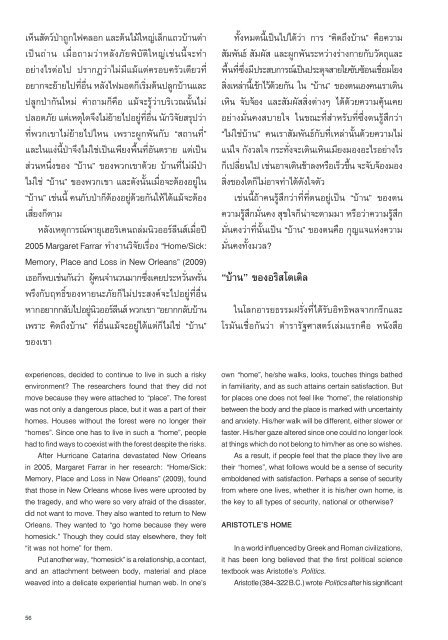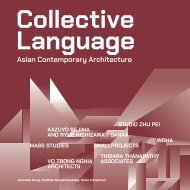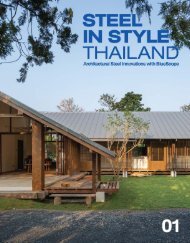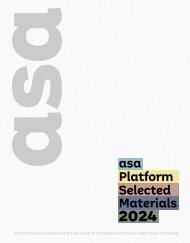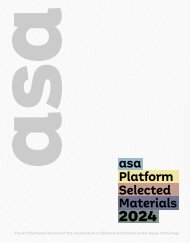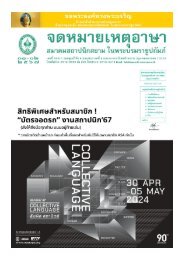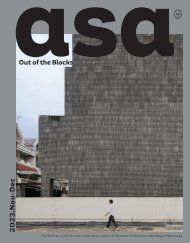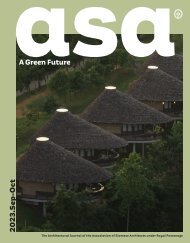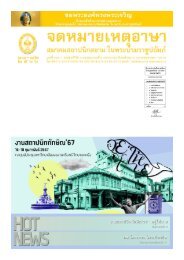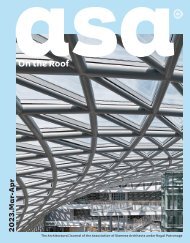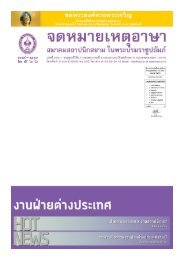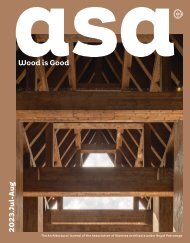บ้านเรือนถิ่นไทยในช่วงเจ็ดทศวรรษ 2489-2559
You also want an ePaper? Increase the reach of your titles
YUMPU automatically turns print PDFs into web optimized ePapers that Google loves.
เห็นสัตว์ป่าถูกไฟคลอก และต้นไม้ใหญ่เล็กแถวบ้านดำ<br />
เป็นถ่าน เมื่อถามว่าหลังภัยพิบัติใหญ่เช่นนี้จะทำ<br />
อย่างไรต่อไป ปรากฏว่าไม่มีแม้แต่ครอบครัวเดียวที่<br />
อยากจะย้ายไปที่อื่น หลังไฟมอดก็เริ่มต้นปลูกบ้านและ<br />
ปลูกป่ากันใหม่ คำถามก็คือ แม้จะรู้ว่าบริเวณนั้นไม่<br />
ปลอดภัย แต่เหตุใดจึงไม่ย้ายไปอยู่ที่อื่น นักวิจัยสรุปว่า<br />
ที่พวกเขาไม่ย้ายไปไหน เพราะผูกพันกับ “สถานที่”<br />
และในแง่นี้ป่าจึงไม่ใช่เป็นเพียงพื้นที่อันตราย แต่เป็น<br />
ส่วนหนึ่งของ “บ้าน” ของพวกเขาด้วย บ้านที่ไม่มีป่า<br />
ไม่ใช่ “บ้าน” ของพวกเขา และดังนั้นเมื่อจะต้องอยู่ใน<br />
“บ้าน” เช่นนี้ คนกับป่าก็ต้องอยู่ด้วยกันให้ได้แม้จะต้อง<br />
เสี่ยงก็ตาม<br />
หลังเหตุการณ์พายุเฮอริเคนถล่มนิวออร์ลีนส์เมื่อปี<br />
2005 Margaret Farrar ทำงานวิจัยเรื่อง “Home/Sick:<br />
Memory, Place and Loss in New Orleans” (2009)<br />
เธอก็พบเช่นกันว่า ผู้คนจ ำนวนมากซึ่งเคยประหวั่นพรั่น<br />
พรึงกับฤทธิ์ของหายนะภัยก็ไม่ประสงค์จะไปอยู่ที่อื่น<br />
หากอยากกลับไปอยู่นิวออร์ลีนส์ พวกเขา “อยากกลับบ้าน<br />
เพราะ คิดถึงบ้าน” ที่อื่นแม้จะอยู่ได้แต่ก็ไม่ใช่ “บ้าน”<br />
ของเขา<br />
experiences, decided to continue to live in such a risky<br />
environment? The researchers found that they did not<br />
move because they were attached to “place”. The forest<br />
was not only a dangerous place, but it was a part of their<br />
homes. Houses without the forest were no longer their<br />
“homes”. Since one has to live in such a “home”, people<br />
had to find ways to coexist with the forest despite the risks.<br />
After Hurricane Catarina devastated New Orleans<br />
in 2005, Margaret Farrar in her research: “Home/Sick:<br />
Memory, Place and Loss in New Orleans” (2009), found<br />
that those in New Orleans whose lives were uprooted by<br />
the tragedy, and who were so very afraid of the disaster,<br />
did not want to move. They also wanted to return to New<br />
Orleans. They wanted to “go home because they were<br />
homesick.” Though they could stay elsewhere, they felt<br />
“it was not home” for them.<br />
Put another way, “homesick” is a relationship, a contact,<br />
and an attachment between body, material and place<br />
weaved into a delicate experiential human web. In one’s<br />
ทั้งหมดนี้เป็นไปได้ว่า การ “คิดถึงบ้าน” คือความ<br />
สัมพันธ์ สัมผัส และผูกพันระหว่างร่างกายกับวัตถุและ<br />
พื้นที่ซึ่งมีประสบการณ์เป็นประดุจสายใยซับซ้อนเชื่อมโยง<br />
สิ่งเหล่านี้เข้าไว้ด้วยกัน ใน “บ้าน” ของตนเองคนเราเดิน<br />
เหิน จับจ้อง และสัมผัสสิ่งต่างๆ ได้ด้วยความคุ้นเคย<br />
อย่างมั่นคงสบายใจ ในขณะที่สำหรับที่ซึ่งตนรู้สึกว่า<br />
“ไม่ใช่บ้าน” คนเราสัมพันธ์กับที่เหล่านั้นด้วยความไม่<br />
แน่ใจ กังวลใจ กระทั่งจะเดินเหินเมียงมองอะไรอย่างไร<br />
ก็เปลี่ยนไป เช่นอาจเดินช้าลงหรือเร็วขึ้น จะจับจ้องมอง<br />
สิ่งของใดก็ไม่อาจทำได้ดังใจตัว<br />
เช่นนี้ถ้าคนรู้สึกว่าที่ที่ตนอยู่เป็น “บ้าน” ของตน<br />
ความรู้สึกมั่นคง สุขใจก็น่าจะตามมา หรือว่าความรู้สึก<br />
มั่นคงว่าที่นั้นเป็น “บ้าน” ของตนคือ กุญแจแห่งความ<br />
มั่นคงทั้งมวล?<br />
“บ้าน” ของอริสโตเติล<br />
ในโลกอารยธรรมฝรั่งที่ได้รับอิทธิพลจากกรีกและ<br />
โรมันเชื่อกันว่า ตำรารัฐศาสตร์เล่มแรกคือ หนังสือ<br />
own “home”, he/she walks, looks, touches things bathed<br />
in familiarity, and as such attains certain satisfaction. But<br />
for places one does not feel like “home”, the relationship<br />
between the body and the place is marked with uncertainty<br />
and anxiety. His/her walk will be different, either slower or<br />
faster. His/her gaze altered since one could no longer look<br />
at things which do not belong to him/her as one so wishes.<br />
As a result, if people feel that the place they live are<br />
their “homes”, what follows would be a sense of security<br />
emboldened with satisfaction. Perhaps a sense of security<br />
from where one lives, whether it is his/her own home, is<br />
the key to all types of security, national or otherwise?<br />
ARISTOTLE’S HOME<br />
In a world influenced by Greek and Roman civilizations,<br />
it has been long believed that the first political science<br />
textbook was Aristotle’s Politics.<br />
Aristotle (384-322 B.C.) wrote Politics after his significant<br />
56


